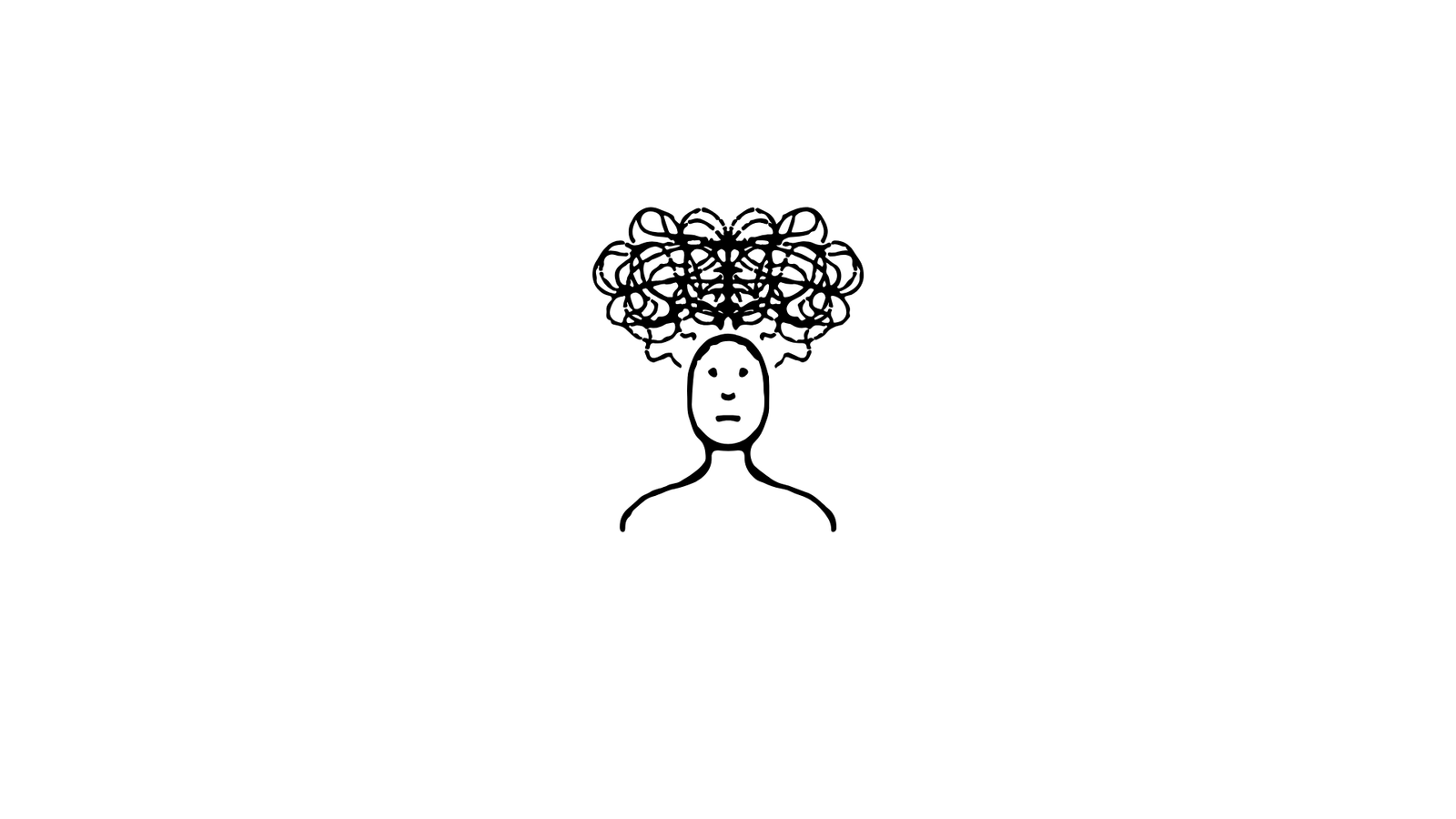Have you ever caught yourself stressing out and overthinking about a situation? That feeling of your mind spiralling out of control, your thoughts darting from place to place and finding yourself stressed about trivial situations. Overthinking has practically become a rite of passage for the new generation, analysing our every choice and replaying conversations in our head, nitpicking at each turn. This shared generational struggle has become a common trait which stops us from thinking rationally or having faith in ourselves. This habit of rumination comes at the hefty cost of your mental energy and peace of mind, we tell ourselves we’re being logical, but to what extent are these thoughts rational?
Did I do well just now?
I think did too much! Or too little?
They definitely see my flaws... My chances are destroyed!
Whether it's in the workplace or in personal relationships, overthinking stunts our growth and our willingness to try. In a city driven by intense competition and comparison, it's easy to lose yourself in worries involving career, family, responsibility etc. Lost in thoughts, you turn to yourself and your mind for advice and reassurance, but the lack of certainty keeps you on edge. We become caught up in worries that our minds create, catastrophising and possibly even creating a self-fulfilling prophecy that we accidentally fall into. Understanding where overthinking stems from and recognising why it happens can be beneficial to help us cope with it in a healthy manner and break the vicious cycle of anxiety.
1. What is Overthinking?
Overthinking is the process of repetitive and unproductive thoughts, which can be focused on different things. Imagine a never-ending loop playing in your mind, replaying past events, worrying about the future, and dissecting every decision you've ever made. People who overthink tend to be stuck thinking about decisions and situations which have happened in the past, pressures of the future or worrying about the circumstances of the present (Leonard, 2023).
We cycle through different scenarios trying to predict the outcome or find solutions, but this can lead us to feel overwhelmed by emotions such as uncertainty or worry. This process of over-analysis may seem helpful initially as a logical way of breaking down scenarios; however, overthinking harms our decision making in addition to actively damaging our mental well-being.
When we overthink, we tend to become more irrational and emotional, stressing out and worrying more than usual. Why is that?
Overthinking damages our ability to make decisions, with excessive rumination being linked to an increase in anxiety and stress (Davis, 2024). The constant barrage of negative thoughts and self-doubt can lower the level of confidence we have in our own decisions. In addition, overthinking can also have a strong link to our mood and emotions. Particularly, future-focused worries have been associated with increased levels of anxiety, whether they are short-term like an assignment or long-term existential concerns, anxiety is increased (McLaughlin et al., 2007).
Overthinking hyjacks our emotional regulation in addition to our cognitive functions, which makes it more difficult to rationally think and navigate through the challenges we face. The amygdala can become hypersensitive during periods of overthinking and rumination, which can lead to the amplification of negative emotions. It can also cause hyperactivity in the prefrontal cortex, an area in the brain which is responsible for higher cognitive functions (Fowler et al., 2017). Ruimination makes us more sensitive to stressful stimuli, making us more prone to overthinking and stress on the outside, but overthinking also leads to changes internally.
Through fMRI research, it was discovered that there are shifts in brain connectivity when rumination occurs, demonstrating that overthinking can lead to changes at the neural level. The habit of rumination leads to higher connectivity within certain areas of the brain which are responsible for self-referencial thinking and emotional stimuli processing (Wexner Medical Center, 2023). This makes it more difficult to shift out of the habit of overthinking, in addition to making people more prone to mental loops that can contribute to depressive relapses.
Overthinking is often counterproductive, as we become lost in our thoughts and distracted in our worries. Indecision and doubt, which typically accompany overthinking, can lead us to stagnation in our pursuits and more worried than before. This pattern erodes self-esteem over time, and hinders our ability to make effective decisions, and possibly disrupts our sleep patterns. Overthinking can feel like a vicious cycle due to its self-perpetuating nature. The more we overthink, the more uncertain and anxious we become, leading to further rumination, trapping us in our own worries.
3. Who’s More at Risk of Overthinking?
Certain risk factors may contribute to the process of overthinking. Overthinking can stem from a combination of personality traits, alongside learned behaviours. Traits such as perfectionist tendencies or a higher sensitivity to new stimuli can make regulating intense emotions more difficult, contributing to an overthinking mindset. The addition of negative thought patterns and anxiety can lead to stress and add to the mental chatter which clouds our focus and peace of mind.
People with a type A personality are more ambitious, organised, and high achieving, always trying to do more in less time. This results in a high level of perfectionism, competitiveness and time management. Although these may be positive traits on the surface, people with these traits may also be more prone to chronic stress and excessive self-criticism. These traits are also linked to depression and anxiety due to their intense nature (Scott, 2024). The perfectionist mindset can cause people to overthink their decisions, resulting burnout and a higher risk of stress and anxiety.
The self-concept is the image that we have of ourselves, and when our ideal-self is invongruent with how you truly are, it can lead to incongruence in your self-concept. People who are aware that they are not who they want to be, or if they are unsure of themselves, tend to overthink more often. It can lead to you becoming a chronic worrier, a stress magnet, harming self esteem having the tendency to feel uncertain and hence catastrophise. These traits can make one more prone to overthinking, having a state of mind where people worry and think too much, eventually using up their own mental energy and burning out. People with an incongruent self-concept have a tendency for negative self-talk, self-judgement and criticism, which can often lead to fatigue and even insomnia, affecting decision making. The feeling of constant uncertainty makes it difficult for one to plan, control or predict a future outcome (Yang et al., 2017). Overthinking may take a stronger hold on people with this habit, reinforcing their maladaptive habits and continuing the vicious cycle.
4. 3 Ways to Stop Overthinking
The reduction of overthinking begins with the acknowledgement and awareness of the habit, and through it, we can regain control of our thoughts and break free from the vicious cycle.
Cognitive behavioural therapy revolves around the concept that thoughts are not facts, and it can help drastically in managing the effects of overthinking. Throu gh changing our thoughts and behaviours, we can alter our feelings towards a situation (APA, 2017). Learning to view our problems with a glass half full instead of a glass half empty mentality can assist our resilience towards mental stress, and eventually reduce overthinking. By acknowledging that you are an overthinking and realising that overthinking may not be helpful, we can reduce these patterns and stop ourselves from spiralling too far, reducing the anxiety we feel.
Getting a different perspective is important in evaluating whether our train of thought is negative, and being able to take an objective look at our thoughts is paramount in stopping overthinking. Utilising mindfulness practices such as meditation, deep breathing and body scans can help us stay in the present, letting us observe our thoughts without judgment and identify any maladaptive thoughts. Then we can challenge these negative thoughts and diminish the influence of overthinking on ourselves.
Taking some time to wind down and relax can be an effective way of reducing anxiety, and in turn, reducing the process of worrying and overthinking. By taking your mind off the stressor, you can distract yourself from rumination and reevaluate your situation again with clear eyes. The benefits of relaxation techniques are that it can easily be done, and it is subjective to yourself. Whether it's going for a walk, watching a good movie, or just having some alone time, taking a step back can help immensely in reducing negative thoughts and overthinking.
Download MindForest App to Reduce Overthinking and Recognize Negative Thought Patterns
Navigating through adult life can often lead to overthinking of the past, the present or the future. MindForest can act as your AI guide, providing strategies and skills to effectively regulate your thoughts, identifying overthinking patterns and enhancing overall well-being and resilience. Explore the features of MindForest designed to assist you in conquering overthinking:
- Thought regulation: MindForest offers the ForestMind AI who can help identify negative thought patterns and maladaptive habits, assisting in giving you new perspective and viewing your situation objectively
- Supportive AI Mentor for Tailored Guidance: Engage with the ForestMind AI who can be attuned to your own stressors and thoughts. Utilize the AI as a tool for guidance and receive customized advice to stop overthinking.
- Reflective Insight Journal for Emotional Awareness: With MindForest, you can document your stressors and thought patterns with ForestMind AI, creating journals that enhance your self-awareness. This reflective practice helps you understand the triggers of your overthinking.
Conquer Overthinking and Control Your Mind
Coping with overthinking is tough, but acknowledging it is the first step! Knowing that you are an overthinker helps pave the road for conquering overthinking. By recognizing the effects of overthinking and understanding how rumination occurs, we can begin to implement strategies to break free from this habit and take proactive action in stopping ourselves. If you find yourself worrying a lot about a situation, ask a friend for their perspective! See if they feel the same way or if you are catastrophizing. Stopping yourself before it gets more serious can bring you peace of mind, helping us cope with it in the process and allow us to cultivate greater mental clarity. The path to stopping overthinking can helps us build mental resilience towards future stressors, to be sure of ourselves again. Through conquering overthinking we can regain control of our train of thought, reclaim faith in ourselves and break free from our critical nitpicking!
References
APA. (2017). What is cognitive behavioral therapy?. American Psychological Association. https://www.apa.org/ptsd-guideline/patients-and-families/cognitive-behavioral
Davis, T. (2024, January 4). Are you an overthinker?. Psychology Today. https://www.psychologytoday.com/us/blog/click-here-for-happiness/202302/are-you-an-overthinker
Fowler, C. H., Miernicki, M. E., Rudolph, K. D., & Telzer, E. H. (2017, October). Disrupted amygdala-prefrontal connectivity during emotion regulation links stress-reactive rumination and adolescent depressive symptoms. Developmental cognitive neuroscience. https://www.ncbi.nlm.nih.gov/pmc/articles/PMC5626656/
Leonard, E. (2023, July 25). 3 origins of overthinking. Psychology Today. https://www.psychologytoday.com/us/blog/peaceful-parenting/202306/3-origins-of-overthinking
McLaughlin, K. A., Borkovec, T. D., & Sibrava, N. J. (2007). The effects of worry and rumination on affect states and cognitive activity. Behavior Therapy, 38(1), 23–38. https://doi.org/10.1016/j.beth.2006.03.003
Scott, E. (2024, May 18). What it means to have type A personality traits. Verywell Mind. https://www.verywellmind.com/type-a-personality-traits-3145240
Wexner Medical Center. (2023, October 27). FMRI study finds correlated shifts in brain connectivity associated with overthinking in adolescents. Ohio State Medical Center. https://wexnermedical.osu.edu/mediaroom/pressreleaselisting/fmri-study-finds-correlated-shifts-in-brain-connectivity-associated-with-overthinking-in-adolescents
YANG, Q., BI, C., LI, L., & HUANG, X. (2017). Self-uncertainty: Concepts,structures,and theories. Advances in Psychological Science, 25(6), 1012. https://doi.org/10.3724/sp.j.1042.2017.01012




